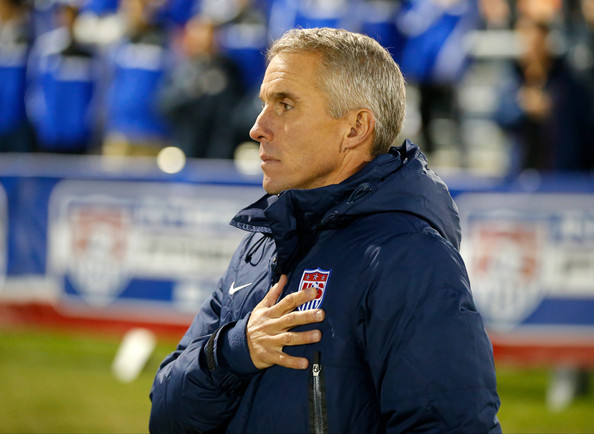By RYAN TOLMICH
In recent seasons, there has been quite the shift in youth soccer in the U.S., and U.S. Under-17 National Team head coach Richie Williams is now seeing the benefits, and drawbacks, of it.
Recently, Williams and the U-17s competed in the 2015 Václav Ježek Tournament, finishing with a 1-1-2 record in a tournament Williams said featured some “interesting” refereeing. Giving up four penalty kicks while receiving none, Williams was overall pleased with his side’s performance, citing compact defending and chance creation as positives.
For the tournament, Williams brought in a strong roster, featuring many of the team’s regulars, including forward Haji Wright, midfielder Christian Pulisic and defender Danny Barbir. Still, Williams says that he has reiterated to his players that spots on the roster for this October’s World Cup are most certainly up for grabs as the next two months will prove crucial for each and every player in the pool.
“We spoke to the group and said that there’s no spot guaranteed,” Williams told SBI. “We’re still two months away and just because you were on the qualifying roster a few months ago, it doesn’t guarantee you a spot in the World Cup. You need to be training well, playing well in games.
“Just like any team, you have to make sure you bring them together and you have to pick the best 21. It’s not always the best 21, but the group of 21 that is going to come together and play as a team and get results as a team.”
Getting that 21 together and in tune has been something that has become all the more challenging in this current cycle.
In recent years, Williams has seen a shift in how young American soccers pursue their careers. Previously, players at the U-17 level were generally part of a residency program, allowing the team to train and play together virtually full time.
Now, Williams says, players are joining clubs at an earlier age, like the aforementioned Wright, Pulisic and Barbir, who are currently with the New York Cosmos, Borussia Dortmund and West Brom, respectively.
In total, Williams says there are six or seven players abroad that are up for World Cup consideration, including a few that couldn’t take part in the most recent tournaments. In addition, Williams says he anticipates that his full group will not be together until October 1, missing out on a pair of September friendlies against France and Mexico.
Williams says the shift in club culture has resulted in the U-17 team functioning much more like a traditional national team, one that has its challenges in coming together.
“We’re in a situation now, which is very unique compared to teams of the past, where we don’t have our players with us,” Williams said. “When they come in, they still need to perform and mesh with the group that we have here full time.
“It’s great experiences for them to be able to play in those games and be able to play in the places they’re playing, getting first team minutes. It’s very encouraging and it’s a great experience that is only going to help them develop. Now it’s a little bit of a balancing act because you don’t have them all the time. Now, you have to bring them back in and get them playing well as a group while integrating them as a team.”
Williams went on to say that, for players at that age level, it’s not just about being with a club; it’s about earning minutes. Wright has recently featured for the Cosmos senior squad after previously playing for the club’s reserve side, while midfielder Tyler Adams has played a prominent role for New York Red Bulls II, going so far as to score against Chelsea in a friendly.
“I think if you look at the example that we’ve had in this cycle with the U-17s, you definitely see it,” Williams said, “and I believe that that is the future. I believe, though, that if it is the future, that it’s not just signing with a team to train. They have to have some type of program where it comes to games. It’s fine to train during the week with the pros, but if they can’t play for the first team, there needs to be a second team.
“Obviously, you see it in MLS with the USL affiliates or having their own USL team or the Cosmos with Cosmos B. It’s important that they still get a game that they can compete in week in, week out. It’s not good enough to just be training with these clubs or training with pros. They need that program in terms of games.”
Ultimately, Williams knows what his purpose is: preparing his players to someday become full internationals.
Williams cited the most recent U.S. U-20 World Cup team, pointing to how many players had come through the U-20 ranks. Next, Williams hopes to see those players progress to the Olympic team before someday, just maybe, earning a senior call-up.
For Williams, no matter what club a player does or doesn’t play for, it’s about the progress, something he hopes to make with this current group ahead of October’s World Cup.
“That’s what it’s all about is getting players experiences, getting players international games,” Williams said. “We are developing. Our players are developing earlier. Players are getting more techinical and understanding the game better tactically.
“Nothing is going to be easy, nothing is handed to you,” Williams added, “but we’re looking forward to it. We’ve shown over the last two years that we can compete against the best teams in the world and we’ve gotten positive results, so we’re going to go out there prepared. We’re going to go out there and play our game and do the best we can to get positive results.”

